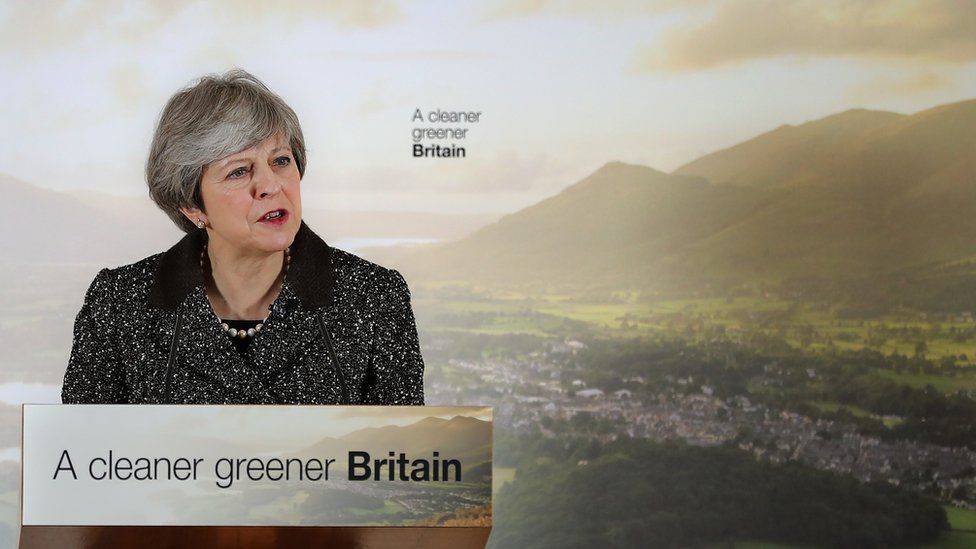Have the Tories blown hot and cold on the environment?
- Published

Conservatism and conservation are "natural allies", Prime Minster Theresa May has said, praising her party's "proud heritage" of protecting the environment.
She pointed to the 1956 Clean Air Act to tackle smog in London and Margaret Thatcher's early warnings about the dangers of global warming.
But more recently, have the Tories been blowing hot and cold about the green agenda?
David Cameron championed the environment as a key issue for his party when he took over as leader in 2005.
"Vote Blue, go Green" he urged voters the following year in local elections, promising a "green revolution" under the Tories, who were to get a new logo in the form of a scribbled tree.
Mr Cameron memorably went to the Arctic to see first-hand the effects of climate change and to be pictured on a dog-driven sled.
"Hug a husky" - as the episode came to be known - became one of the defining images representing his attempts to modernise and rebrand the Conservative Party to broaden its appeal.
The Conservatives went into the 2010 election promising to be the greenest government in history.
There were pledges to reduce emissions, to promote low carbon technology, to conserve natural habitats and an offer of a so-called Green Deal to improve energy efficiency in homes.
But once in power, in coalition with the Liberal Democrats, critics say, David Cameron's enthusiasm for the green agenda began to wane, and some questioned his genuine commitment to the cause.
The government was preoccupied with reducing the deficit and putting the brakes on public spending, and the Lib Dems took charge of the flagship announcement of the introduction of a 5p tax on plastic bags.
There was also a planned sell-off of state-owned woodland in England.
In 2013, it was reported that David Cameron had told Downing Street aides to "get rid of all the green crap" - referring to environmental levies on energy bills.
And he backed fracking, to the dismay of green campaigners.
After the 2015 election yielded a Conservative majority, the Green Deal for home insulation was scrapped and subsidies for on-shore wind farms came to an end a year earlier than initially planned.
Now, Theresa May has decided that championing the environment should, once again, be one of the central themes of a Conservative government.
She's promised that there will be no watering down of EU environment regulations after Brexit - and put forward a series of measures to try to rein in the use of disposable plastics.
Mrs May has one of her "big beasts", Michael Gove, in charge of policy.
After an unexpected return to the cabinet last summer - he's clearly making the most of an opportunity, launching a number of high-profile initiatives with savvy social media campaigns, such as a ban on ivory sales.
The prime minister hopes the strategy will help her win over young voters who deserted the Conservatives at the election.
But Green activists have already criticised her plans as being too vague.
And Mrs May's former communications director Katy Perrior has said the 25-year environment plan launched on Thursday was originally intended to be "as boring as possible," and while the prime minister's enthusiasm for protecting the environment "may not be insincere", it is "certainly new".
Cynics will accuse the government of sensing the environment could be a vote-winner and throwing its weight behind the green agenda.
But, speaking at the launch, Theresa May said care for the natural world was at the core of her party's philosophy.
"Making good on the promise that each new generation should be able to build a better future is a fundamental Conservative principle," she said.
- Published10 December 2017